Ford Explorer EV vs Hyundai Staria – Which one offers the better deal?
Compare performance, boot capacity, efficiency and price at a glance.
Find out which car is the better choice for you – Ford Explorer EV or Hyundai Staria?
Costs and Efficiency:
Price and efficiency are often the first things buyers look at. Here it becomes clear which model has the long-term edge – whether at the pump, the plug, or in purchase price.
Ford Explorer EV has a distinct advantage in terms of price – it starts at 34200 £, while the Hyundai Staria costs 42400 £. That’s a price difference of around 8228 £.
Engine and Performance:
Under the bonnet, it becomes clear which model is tuned for sportiness and which one takes the lead when you hit the accelerator.
When it comes to engine power, the Ford Explorer EV has a evident edge – offering 340 HP compared to 225 HP. That’s roughly 115 HP more horsepower.
In acceleration from 0 to 100 km/h, the Ford Explorer EV is decisively quicker – completing the sprint in 5.30 s, while the Hyundai Staria takes 10.20 s. That’s about 4.90 s faster.
In terms of top speed, the Ford Explorer EV performs minimal better – reaching 180 km/h, while the Hyundai Staria tops out at 167 km/h. The difference is around 13 km/h.
There’s also a difference in torque: Ford Explorer EV pulls significantly stronger with 679 Nm compared to 367 Nm. That’s about 312 Nm difference.
Space and Everyday Use:
Beyond pure performance, interior space and usability matter most in daily life. This is where you see which car is more practical and versatile.
Seats: Hyundai Staria offers significantly more seating capacity – 9 vs 5.
In curb weight, Ford Explorer EV is slightly lighter – 1908 kg compared to 2275 kg. The difference is around 367 kg.
In terms of boot space, the Hyundai Staria offers clearly more room – 831 L compared to 450 L. That’s a difference of about 381 L.
In maximum load capacity, the Ford Explorer EV performs slight better – up to 1422 L, which is about 119 L more than the Hyundai Staria.
When it comes to payload, Hyundai Staria clearly perceptible takes the win – 775 kg compared to 585 kg. That’s a difference of about 190 kg.
Who wins the race?
The Ford Explorer EV proves to be outperforms in nearly all aspects and therefore becomes our DriveDuel Champion!
Ford Explorer EV is the better all-rounder in this comparison.
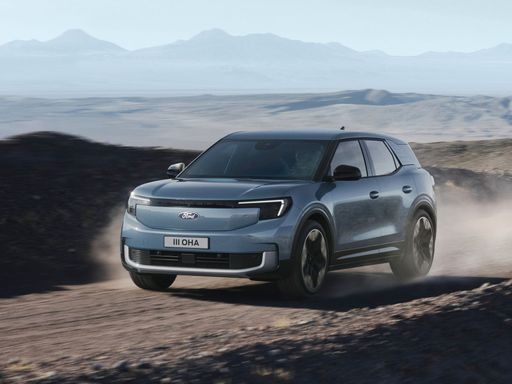 @ Ford Motor Company / Ford Media Center
@ Ford Motor Company / Ford Media Center
Ford Explorer EV
Ford Explorer EV
The Ford Explorer EV marks a significant step forward in the brand's journey towards electrification, offering an impressive blend of performance and sustainability. This modern SUV features a sleek design complemented by advanced technology that enhances the driving experience. With a focus on comfort and innovation, the Explorer EV aims to redefine family travel for the electric age.
details @ Ford Motor Company / Ford Media Center
@ Ford Motor Company / Ford Media Center
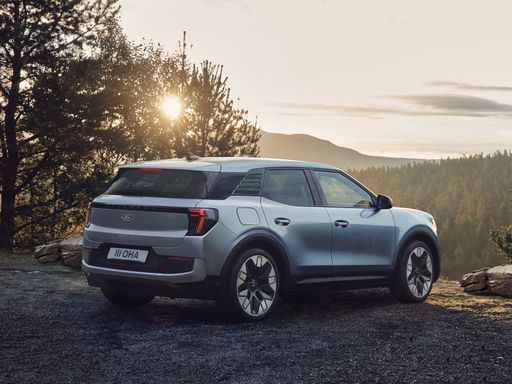 @ Ford Motor Company / Ford Media Center
@ Ford Motor Company / Ford Media Center
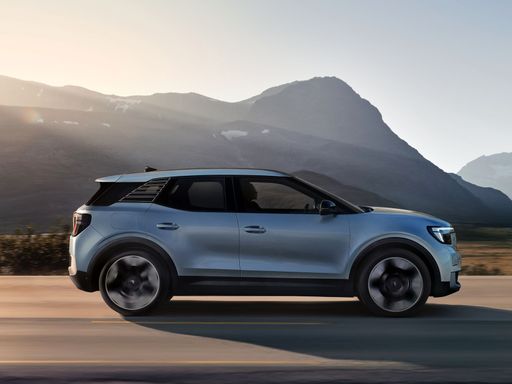 @ Ford Motor Company / Ford Media Center
@ Ford Motor Company / Ford Media Center
Hyundai Staria
The Hyundai Staria stands out with its futuristic design, characterised by sleek lines and an expansive front grille that makes a bold statement on the road. Inside, it offers a spacious and versatile interior, providing a comfortable ride for both driver and passengers. This vehicle effortlessly combines practicality with a touch of luxury, appealing to families and professionals alike.
details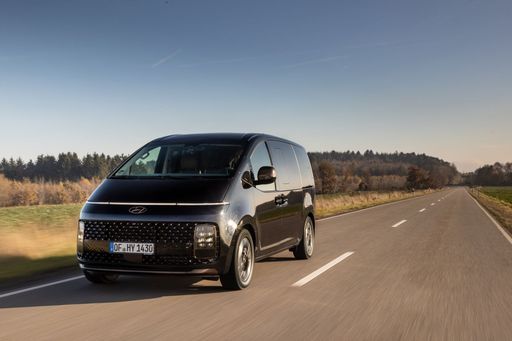 @ Hyundai Motor Company
@ Hyundai Motor Company
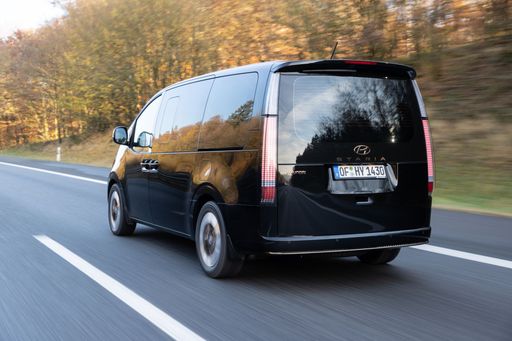 @ Hyundai Motor Company
@ Hyundai Motor Company
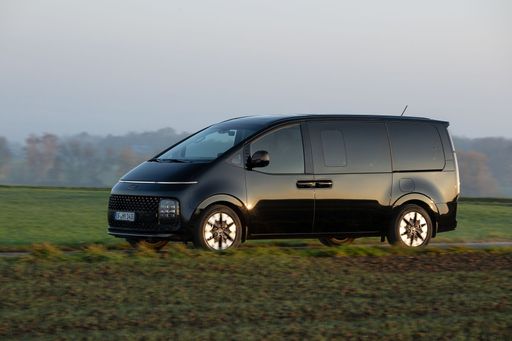 @ Hyundai Motor Company
@ Hyundai Motor Company
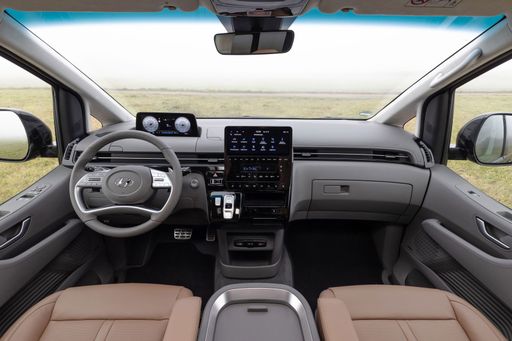 @ Hyundai Motor Company
@ Hyundai Motor Company
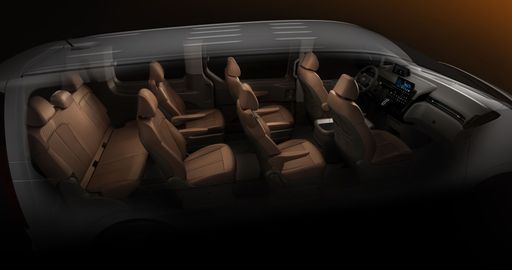 @ Hyundai Motor Company
@ Hyundai Motor Company
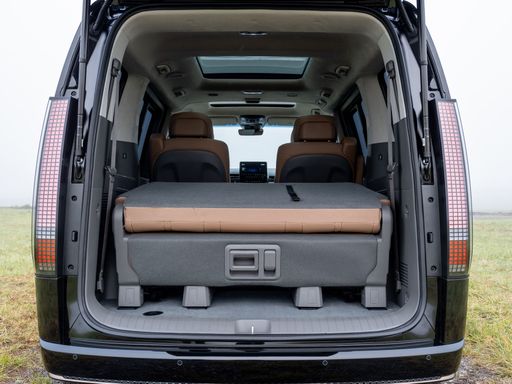 @ Hyundai Motor Company
@ Hyundai Motor Company
 @ Ford Motor Company / Ford Media Center
@ Ford Motor Company / Ford Media Center
|
 @ Hyundai Motor Company
@ Hyundai Motor Company
|
|
|
|
Costs and Consumption |
|
|---|---|
|
Price
34200 - 48800 £
|
Price
42400 - 50500 £
|
|
Consumption L/100km
-
|
Consumption L/100km
7.60 L
|
|
Consumption kWh/100km
14.5 - 17.2 kWh
|
Consumption kWh/100km
-
|
|
Electric Range
360 - 602 km
|
Electric Range
-
|
|
Battery Capacity
52 - 79 kWh
|
Battery Capacity
-
|
|
co2
0 g/km
|
co2
172 g/km
|
|
Fuel tank capacity
-
|
Fuel tank capacity
65 L
|
Dimensions and Body |
|
|---|---|
|
Body Type
SUV
|
Body Type
Bus
|
|
Seats
5
|
Seats
7 - 9
|
|
Doors
5
|
Doors
5
|
|
Curb weight
1908 - 2179 kg
|
Curb weight
2275 - 2345 kg
|
|
Trunk capacity
445 - 450 L
|
Trunk capacity
117 - 831 L
|
|
Length
4468 mm
|
Length
5253 mm
|
|
Width
1871 mm
|
Width
1997 mm
|
|
Height
1630 - 1639 mm
|
Height
1990 mm
|
|
Max trunk capacity
1417 - 1422 L
|
Max trunk capacity
431 - 1303 L
|
|
Payload
561 - 585 kg
|
Payload
605 - 775 kg
|
Engine and Performance |
|
|---|---|
|
Engine Type
Electric
|
Engine Type
Full Hybrid
|
|
Transmission
Automatic
|
Transmission
Automatic
|
|
Transmission Detail
Reduction Gearbox
|
Transmission Detail
Automatic Gearbox
|
|
Drive Type
Rear-Wheel Drive, All-Wheel Drive
|
Drive Type
Front-Wheel Drive
|
|
Power HP
170 - 340 HP
|
Power HP
225 HP
|
|
Acceleration 0-100km/h
5.3 - 8.7 s
|
Acceleration 0-100km/h
10.20 s
|
|
Max Speed
160 - 180 km/h
|
Max Speed
167 km/h
|
|
Torque
310 - 679 Nm
|
Torque
367 Nm
|
|
Number of Cylinders
-
|
Number of Cylinders
4
|
|
Power kW
125 - 250 kW
|
Power kW
165 kW
|
|
Engine capacity
-
|
Engine capacity
1598 cm3
|
General |
|
|---|---|
|
Model Year
2024 - 2025
|
Model Year
2024
|
|
CO2 Efficiency Class
A
|
CO2 Efficiency Class
F
|
|
Brand
Ford
|
Brand
Hyundai
|
What drive types are available for the Ford Explorer EV?
The Ford Explorer EV is available as Rear-Wheel Drive or All-Wheel Drive.
The prices and data displayed are estimates based on German list prices and may vary by country. This information is not legally binding.
